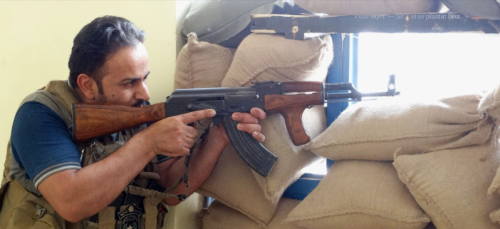
New setbacks in the fight against the Islamic State of Iraq and Syria (known as ISIS or ISIL) came May 17 after the militant group took over Ramadi, a key strategic city in central Iraq. The fall of the city came after seven more airstrikes in Ramadi by the U.S.-led coalition.
Despite recent airstrikes carried out by the U.S. and its allies, ISIS — the Sunni organization seeking to create an Islamic state in Syrian and Iraqi territory — has continued its advances, which include the additional capture of the ancient Syrian city Palmyra on Thursday, May 21. The fall of the city is the biggest victory for the organization so far, according to The New York Times, and visibly demonstrates that the war is far from over.
“ISIS is still a viable force, and this siege punches a hole in the Obama narrative that the situation is contained,” Scott Hibbard, associate political science professor, said. “We have a long way to go in defeating ISIS.”
The fall of Ramadi showcases another setback in the Iraq battleground. The collapse of the Iraqi police and military forces occurred last summer during the first wave of ISIS fighting in the country. The lack of a local Iraqi force to fight ISIS factored into lost control of Anbar province, and Ramadi, as the province’s capital city, was given strategic importance as coalitions began bombing in earnest.
The roots of ISIS stem from America’s 2003 invasion of Iraq and the deposition of Saddam Hussein, and we’re seeing “direct ramifications of (the invasion),” according to Hibbard. By taking Hussein out of power, a “power vacuum” opened, one that ISIS and other terror organizations filled.
Though many agree the U.S. should not put boots on the ground, the U.S.-led coalition are running out of options beyond airstrikes. Further support of local forces is one alternative option to the putting of troops on the ground; the U.S. and its allies have helped train and fund resistance forces in the past. The Peshmerga and Shia militias have fared better than the official Iraqi military forces receiving support from America.
“It’s easier to get into these places than it is to get out of them,” Thomas Mockaitis, history professor, said. “We should let the threatened countries fight their own wars and support from a distance.”
Now that Ramadi is in ISIS’ hands, strategies and options will be weighed before continuing. Though there is hope that ISIS will be defeated, the questions of how and when remain. Despite the lack of undisputedly strong options, Mockaitis believes, “eventually ISIS will be defeated, but it will take locals fighting with U.S. support.” But the timeline, specifically at this stage, is up in the air.
“If we’re trying to solve the sectarian problem, we have another generation or two before that’s solved,” Hibbard said. “If we’re trying to solve the problem of regional stability first, then it’s
easier than we think. The violence has to be contained and there has to be a political resolution and a larger regional settlement.”

